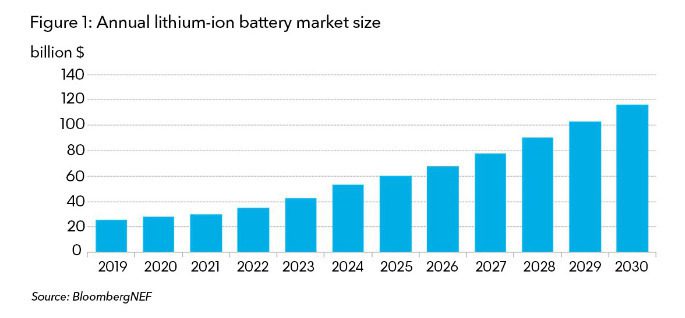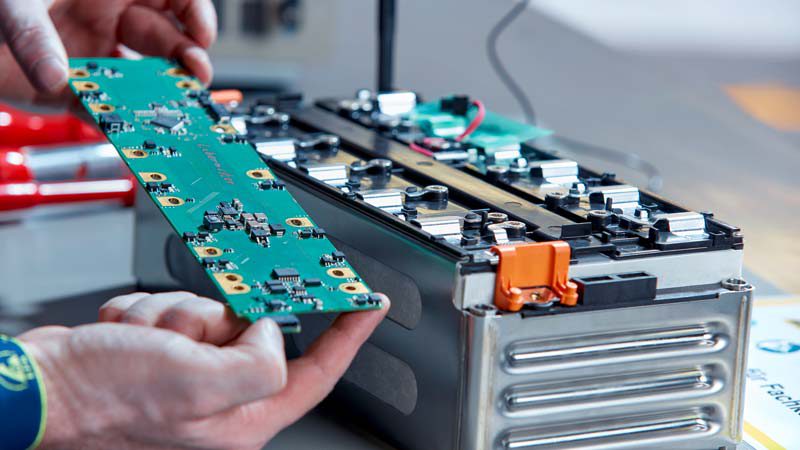The rise in production of battery packs to supply the increasing demand for electric vehicles (EVs) has results in significant falls in both prices and emissions, according to new reports.
A recent report published by Bloomberg New Energy Finance (BNEF) says that since 2010 battery prices have dropped from $US1,100/kWh ($A1,609) and should reach near the magical $US100/kWh mark ($A146) by 2023, at which time EV purchase prices will be on par with internal combustion engine vehicles.
Battery prices, which were above $1,100 per kilowatt-hour in 2010, have fallen 87% in real terms to $156/kWh in 2019. By 2023, average prices will be close to $100/kWh.
Learn more from our 2019 Battery Price Survey here: https://t.co/IRGreo1LGE pic.twitter.com/LvkMcRMaaG
— BloombergNEF (@BloombergNEF) December 3, 2019
This is by and large due to increasing order sizes, as well as increased use of high energy density cathodes and improved pack designs.
“Factory costs are falling thanks to improvements in manufacturing equipment and increased energy density at the cathode and cell level. The expansion of existing facilities also offers companies a lower-cost route to expand capacity,” said head of energy storage at BNEF Logan Goldie-Scot in the report.
Battery prices are a key factor in the cost of EVs, and will largely dictate when the ticket price of EVs falls to parity with petrol and diesel vehicles, at which point the sale of EVs is expected to take off.
According to the BNEF report, cumulative demand for EV batteries will reach 2TWh by 2024, at which time battery prices should fall below $US100/kWh ($A146).
As battery prices fall, the electrification of various transport sectors is also becoming more attractive, a snowball effect that could see the EV battery market take off before 2030.
“According to our forecasts, by 2030 the battery market will be worth $116 billion annually, and this doesn’t include investment in the supply chain. However, as cell and pack prices are falling, purchasers will get more value for their money than they do today,” said James Frith, BNEF’s senior energy storage analyst and author of the report.

This rapid increase in demand of electric vehicle batteries has also seen the climate impact of electric vehicle batteries halve, according to a report by Swedish environmental research group IVL.
The report, which was published by IVL on Wednesday (Europe time), suggests that since its last report on the matter in 2017, battery production now results in as much as half the emissions as previously thought, with between 61-106kg/CO2 equivalent per kilowatt hour capacity produced.
Scale up of production resulting in greater efficiencies, as well as reduced reliance on fossil fuels for power to produce batteries, and greater transparency of data used in the new study have led to the findings, say researchers.
“In both the previous and the current report, we have focused on the latest and most transparent data. The higher range in the previous study was due to the electricity used in the battery factories utilizing a high proportion of fossil fuels,” said Lisbeth Dahllöf, researcher at IVL in a press release.
The 2017 report by contrast showed that battery manufacturing facilities – many of them still pilots – then emitted 150-200kg/CO2 equivalent per kilowatt hour capacity produced.
Emission sources considered in the report included sourcing of materials as well as manufacture of cells and compiling of battery packs, with data gleaned from scientific articles, reports and carmakers’ websites.
However, the authors of the report noted that better data particularly regarding raw material production and the manufacture of other battery components would further improve an understanding of EV battery-related climate emissions.
“Mining can have a significant environmental and social impact. Batteries contain metals such as lithium, cobalt, nickel and manganese,” said researcher Erik Emilsson in a statement.
“More information is needed on the environmental impact of metal supply chains as well as better traceability processes if we are to ensure sustainable production across the entire chain.”

Bridie Schmidt is associate editor for The Driven, sister site of Renew Economy. She has been writing about electric vehicles since 2018, and has a keen interest in the role that zero-emissions transport has to play in sustainability. She has participated in podcasts such as Download This Show with Marc Fennell and Shirtloads of Science with Karl Kruszelnicki and is co-organiser of the Northern Rivers Electric Vehicle Forum. Bridie also owns a Tesla Model Y and has it available for hire on evee.com.au.

